HubSpot es una de las herramientas más conocidas del mercado en materia de CRM y automatización de Marketing (Marketing Hub), pero sus precios no se adaptan a todas las empresas. En este artículo, descubrirás 10 alternativas a HubSpot que puedes considerar, enfocadas en obtener una automatización de marketing asequible y eficaz así como funcionalidades de CRM.
Por tanto, vas a encontrar 10 alternativas a Hubspot CRM y su Marketing Hub. En cada alternativa se indica si se trata de una herramienta de automatización de marketing, de CRM, o ambas (como Brevo o Freshworks).
Hoy en día, prácticamente todas las organizaciones pueden permitirse un software para automatizar sus procesos y tareas de marketing, como el envío de correos electrónicos, la gestión de redes sociales y la segmentación de audiencias. Encontrar una herramienta asequible con las funciones adecuadas se traducirá en un ahorro de tiempo importante y una mejora de las conversiones.
Automatiza tu marketing con Brevo
Define tus flujos de trabajo fácilmente, segmenta tus audiencias y envía mensajes personalizados eficaces en la Marketing Platform.Razones para buscar una alternativa a HubSpot
Con más de 205 000 usuarios en el mundo, HubSpot es uno de los líderes de la industria de la automatización del marketing en 2024. Se trata de una plataforma con herramientas de marketing eficaces, que se integran con un software de CRM avanzado con el que los equipos de ventas pueden llevar el seguimiento de prospectos. Ofrece más de un centenar de integraciones nativas con herramientas externas y 6000 a través de Zapier.
La gestión de contactos de HubSpot, que permite almacenar los datos de hasta 15 millones de personas, puede ser adecuada para estrategias de marketing a gran escala. En cambio, las pymes y startups deben conocer los pormenores del modelo tarifario y otros aspectos de HubSpot antes de decidirse por este software de automatización.
Saltos tarifarios considerables
El Marketing Hub de HubSpot ofrece un plan gratuito y el plan Starter por 20 €/mes por cada licencia. Desde ahí, salta directamente al plan Pro con una tarifa de 880 € mensuales con un mínimo de tres licencias. Empezar a usar las herramientas de marketing es sencillo y asequible, pero hay necesidades a medio y largo plazo que debes prever.
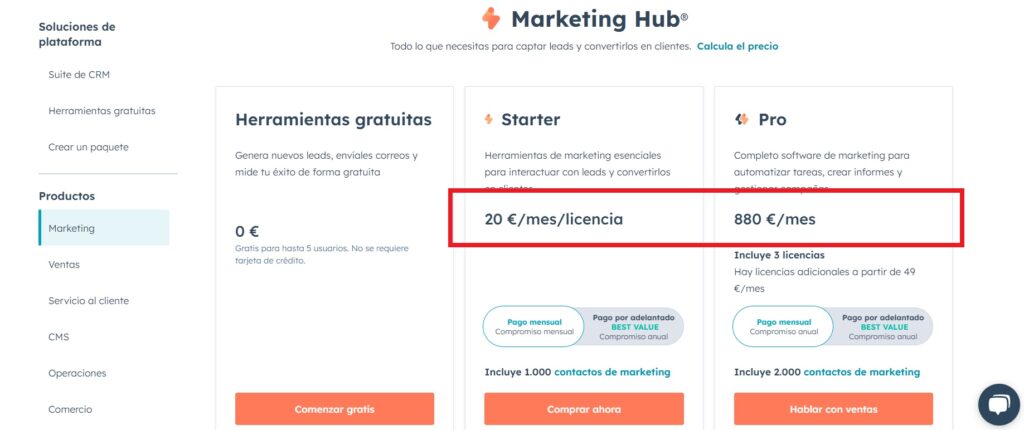
Si usas la versión gratuita del Marketing Hub de HubSpot:
- Solo puedes enviar 2000 correos electrónicos al mes. El email marketing es el canal que más se automatiza, por lo que es fácil alcanzar esa cifra.
En el plan Starter (a partir de 20 €/mes), tienes acceso a funcionalidades como:
- Personalizar las llamadas a la acción.
- 10 automatizaciones
En cambio, estas son algunas características que solo están disponibles tras el salto tarifario al plan Pro, disponible a partir de 880 € mensuales:
- Pruebas A/B, un recurso común para determinar qué páginas de destino y correos electrónicos generan mejores resultados
- Campañas de WhatsApp Marketing
- Estadísticas de SEO (impresiones de cada página, clics)
- Cuentas de redes sociales conectadas con la herramienta
- Calificación de contactos para desarrollar estrategias de lead nurturing
- Gestión de contenido dinámico que se adapta a los clientes potenciales
Se trata de necesidades que suelen surgir a corto o medio plazo para optimizar las campañas de marketing, y más baratas en las alternativas a HubSpot que presenta el artículo.
Tarifas limitadas por el número de contactos
Las tarifas anteriores de HubSpot aumentan cuando crece el número de contactos de marketing. No es la única herramienta de automatización de marketing que basa sus presupuestos en el tamaño de la base de datos de contactos, pero los precios de HubSpot escalan de forma particularmente rápida.
Una campaña de marketing se planifica para crecer, por lo que es normal y deseable que con el tiempo se inscriban nuevos prospectos. Al elegir un software de automatización, más allá del precio inicial, es importante la planificación presupuestaria a medio plazo. Esta sería la evolución del precio mensual de los planes más básicos de HubSpot:
Solo se paga por los contactos activos a los que se les envían correos de marketing o anuncios, lo que permite almacenar contactos adicionales en el CRM sin costo extra. Se indican los precios con una facturación mensual en el momento de publicación del artículo.
La mayoría de alternativas a HubSpot escalan esta limitación de forma más progresiva. Brevo, por su parte, permite almacenar contactos ilimitados en todos sus planes.
Costes de incorporación
Además de la tarifa mensual, la suscripción al plan Pro y las opciones superiores de HubSpot implica una tarifa de incorporación u onboarding a partir de 2930 €, que se pagan solo una vez. Este pago incluye un servicio de asesoramiento personalizado de HubSpot para sacar partido a todas las funciones de marketing.
Herramientas especializadas
Las opciones básicas de HubSpot se caracterizan por su facilidad de uso. Sin embargo, para sacar partido a los recursos avanzados son necesarios conocimientos más avanzados en automatización de marketing. Por eso, HubSpot incluye un servicio de incorporación obligatorio a partir del plan Pro.
Otras herramientas ofrecen una curva de aprendizaje más progresiva, con la ayuda de sus servicios de atención al cliente para consultas técnicas. Si tus recursos lo permiten, podrás contratar a los expertos que tú elijas para que te asesoren con tu estrategia de forma más profunda.
Diez alternativas a Hubspot
En esta sección, podrás descubrir 10 alternativas a HubSpot Marketing Hub con herramientas de automatización del marketing eficaces. Ocho de ellas son ideales para startups y/o pequeñas y medianas empresas.
No dejes de consultar nuestra comparación de los 8 mejores software CRM para pymes si tu prioridad son estas plataformas.
Brevo: precios progresivos según emails enviados
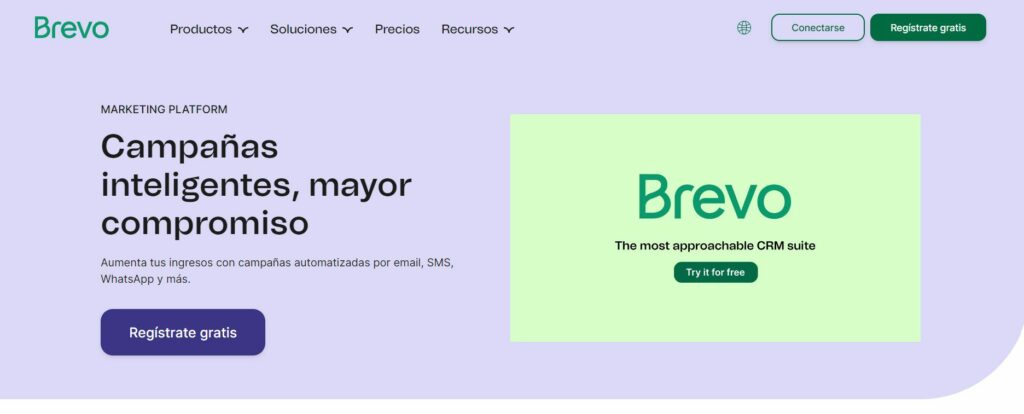
Brevo es una herramienta de automatización del marketing y CRM con más de 500 000 usuarios que ofrece una estructura de precios más asequible y progresiva que la de HubSpot. Permite almacenar contactos ilimitados, el precio depende del número de emails enviados al mes con la plataforma.
En todos los planes de la Marketing Platform de Brevo, incluyendo la versión gratuita, se puede acceder a un editor de automatizaciones de arrastrar y soltar, segmentación avanzada y herramientas de automatización de ventas como la programación de reuniones, entre otras ventajas. El asistente de inteligencia artificial de Brevo ayuda a generar contenido de marketing.
Por un precio inicial de 49 €/mes, se puede acceder a funciones equivalentes a las del plan Pro de HubSpot, como las pruebas A/B, el editor de páginas de destino (landing pages) y la gestión de anuncios en Facebook. También es posible configurar campañas multicanal por WhatsApp y SMS, con las respectivas extensiones.
Brevo incluye 500 impresiones de notificaciones emergentes gratis, mientras que HubSpot ofrece un centenar gratis y precios más elevados por impresión. Brevo tiene aplicación móvil para sus servicios Conversaciones y Phone.
Para necesidades avanzadas, algunos usuarios declaran que el CRM de HubSpot es más adaptable. El equipo de ventas de Brevo ofrece información y presupuestos a medida con el plan Entreprise, para quienes necesitan estas funcionalidades a gran escala (por ejemplo, más de una bandeja de entrada).
Precios de Brevo
- Plan gratuito con contactos ilimitados que permite enviar 300 emails al día (es decir, 9000 al mes)
- Precios según el volumen mensual de emails enviados
- Plan Starter (sin límite de envío diario): 19 €/mes por 20 000 emails mensuales, 29 € por 40 000
- Plan Business (landing pages, pruebas A/B, automatización sin límite de contactos): 49 €/mes por 20 000 emails mensuales, 59 € por 40 000, 79 € por 60 000
- No hay tarifa de incorporación
Una disposición para crear contenido
Una disposición para crear contenido muy intuitiva y fácil de manejar, para poder brindar, en mi caso, sobre todo, información de mi actividad profesional.
Feliz J. García,
ActiveCampaign: automatización avanzada para pymes

ActiveCampaign es una de las alternativas a HubSpot Marketing Hub más adecuadas para startups, gracias a su facilidad de uso y a sus herramientas avanzadas para personalizar la experiencia de cliente.
Su plataforma de marketing destaca por ofrecer más de 850 recetas de automatización prediseñadas en todos sus planes tarifarios: se pueden establecer condiciones multivariable para desencadenar una acción, seguimiento de clientes potenciales, automatización de ventas, registro de comportamiento en el sitio web, etc.
El embudo de ventas de ActiveCampaign es totalmente personalizable y se integra con el software de CRM y email marketing de la plataforma, con flujos de trabajo intuitivos que se aprenden a manejar bastante rápido. Se integra con más de 870 herramientas externas.
También es posible gestionar la publicidad en redes sociales y el marketing por SMS. Los informes automatizados que genera ActiveCampaign ofrecen datos sobre todos los aspectos de las campañas de marketing y están disponibles a precios más asequibles que los de HubSpot, aunque ofrecen menos versatilidad para generar vistas comparativas.
Precios de ActiveCampaign
- ActiveCampaign no ofrece plan gratuito.
- Tarifas en función del número de contactos
- Plan Lite (automatización del marketing completa): 39 $/mes para 1000 contactos, 99 $/mes para 5000 contactos.
- Plan Plus (publicidad en redes sociales, páginas de destino): 70 $/mes para 1000 contactos, 149 $/mes para 5000 contactos.
- Descuentos por facturación anual
Salesforce Marketing Cloud: herramienta avanzada para grandes empresas
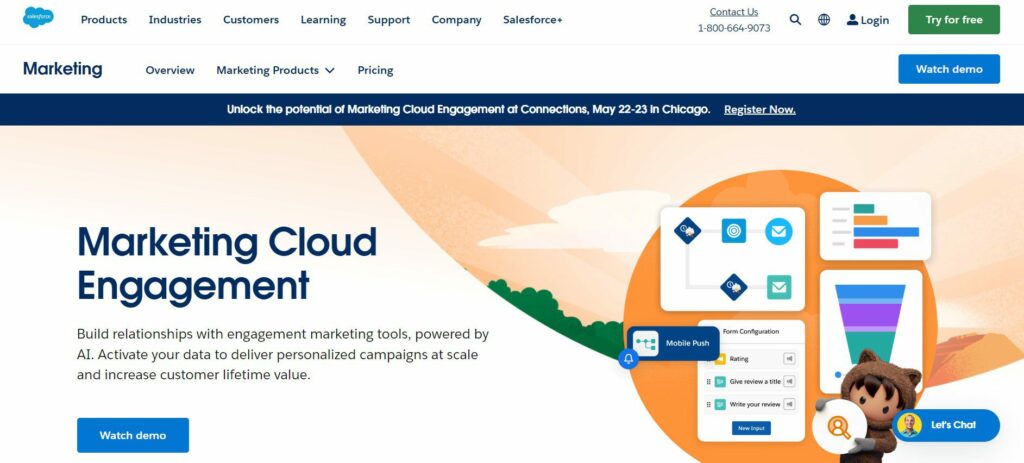
Salesforce Marketing Cloud es una solución de automatización del marketing altamente especializada, dirigida principalmente a grandes empresas del sector B2B. Tiene un coste mayor que HubSpot Marketing Hub, pero es valiosa en sectores donde la captación y gestión de prospectos son cruciales y hay que realizar una gran inversión en el proceso de ventas. Salesforce tiene 150 000 usuarios en todo el mundo, pero esta cifra también incluye a quienes solo usan el CRM.
En todos sus planes, Salesforce ofrece funciones de marketing avanzadas como envíos ilimitados de email marketing, pruebas A/B y multivariables y seguimiento de redes sociales, entre otras. La cantidad de automatizaciones que se pueden configurar varía según el plan elegido.
Una de las grandes fortalezas de Salesforce son sus automatizaciones complejas, difícilmente igualables por competidores. La segmentación se basa en el sistema Einstein de inteligencia artificial para analizar el comportamiento de los clientes potenciales en tiempo real con precisión, lo que aporta predicciones fiables sobre las probabilidades de conversión.
Por lo anterior, Salesforce también tiene una curva de aprendizaje muy pronunciada, frente a la facilidad de uso de HubSpot. Para realizar la integración, suele ser necesaria la contratación de un especialista en Salesforce, y los consultores certificados siguen siendo bastante exclusivos. Sin embargo, esta complejidad también se traduce en una personalización superior.
Precios de Salesforce Marketing Cloud
- El servicio Marketing Cloud de Salesforce tiene precios entre 1250 y 4400 €/mes, para gestionar hasta 10 000 contactos.
- Salesforce indica que los precios de Marketing Cloud son orientativos
- Los precios del CRM de ventas se abonan aparte, con tarifas iniciales de 25 € y 80 € por usuario al mes. El CRM ofrece prueba gratuita.
Freshworks: CRM con automatización para pymes
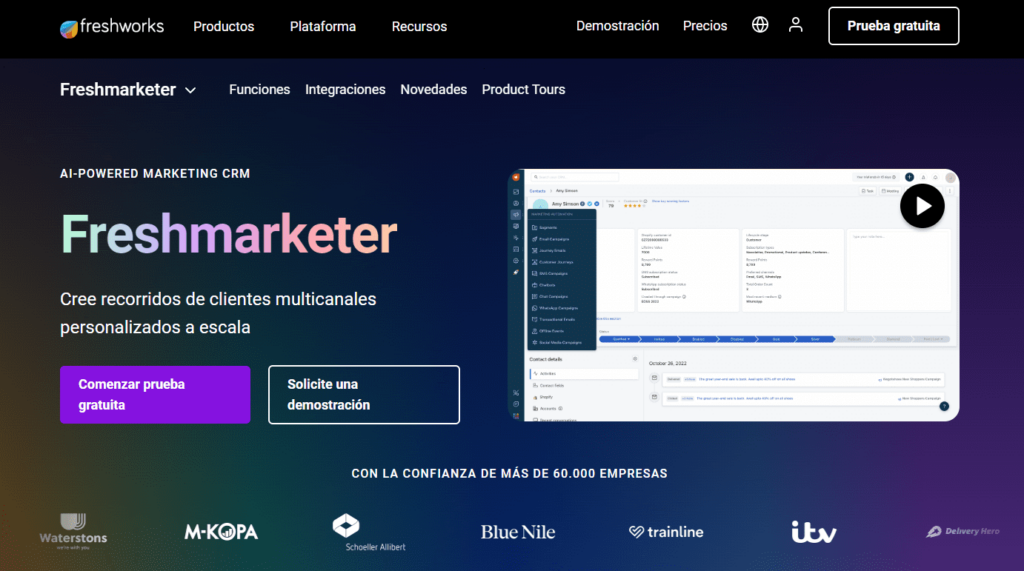
Freshworks es una plataforma de CRM y automatización con más de 60 000 usuarios en todo el mundo, que suele ofrecer las funciones de marketing adecuadas para pequeñas y medianas empresas.
A través de su software Freshmarketer, ofrece recursos para email y redes sociales en su plan gratis. Estos canales se complementan SMS, WhatsApp y chatbot en la versión de pago. Las herramientas de automatización también están disponibles en los planes de pago e incluyen, por ejemplo, flujos de trabajo creados a partir de un chatbot.
El asistente de inteligencia artificial Freddy, que se adquiere con una extensión independiente, permite automatizar la creación de campañas de marketing. Las pruebas A/B y otros recursos para optimizar la tasa de conversión (CRO) también se abonan aparte.
Estos recursos se combinan con las funciones de automatización de ventas de Freshsales, como sus más de 20 plantillas para automatizar recorridos de comercio electrónico.
Precios de Freshworks
Una de las ventajas significativas de Freshworks frente a HubSpot es su estructura de precios más sencilla, con menores saltos de precios.
- Freshworks ofrece un plan gratuito para tres usuarios y 100 contactos de marketing. No incluye informes y las automatizaciones son muy limitadas, mientras que HubSpot ofrece estadísticas en su versión gratuita.
- Freshmarketer tiene un único plan de pago, que no incluye las extensiones de IA y CRO. Cuesta 18 €/mes para 500 contactos.
- El CRM Freshsales tiene su propia estructura de tarifas independiente.
Klaviyo: marketing especializado en comercio electrónico
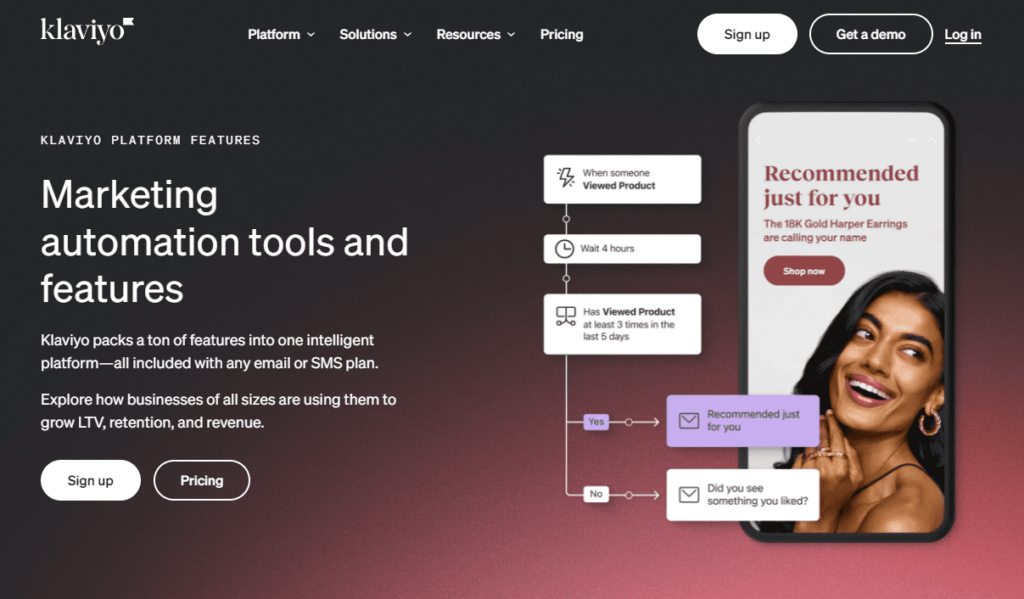
Con más de 143 000 usuarios, Klaviyo es un software de automatización del marketing especializado para empresas de comercio electrónico. Su punto fuerte son las funciones avanzadas basadas en análisis del comportamiento del cliente, como los emails de recomendaciones personalizadas y los recordatorios de carrito abandonado.
Asimismo, Klaviyo destaca por la facilidad de uso de su creador de automatizaciones de arrastrar y soltar. El trabajo de gestión de contactos de la plataforma sirve para establecer una segmentación bastante exhaustiva que ayuda, por ejemplo, a predecir la mejor acción para realizar con cada prospecto.
Esta herramienta se integra con más de 300 aplicaciones externas de comercio electrónico, como Shopiy, WooCommerce y Square. También se puede conectar con Meta para la gestión de anuncios de redes sociales en Facebook e Instagram; y ofrece un complemento para automatizar el marketing por SMS.
Aunque el tratamiento de datos y creador de flujos de trabajo de HubSpot se adaptan a grandes empresas, Klaviyo es una de las mejores alternativas para escalar una estrategia de marketing en comercio electrónico.
Precios de Klaviyo
- Versión gratuita hasta 250 contactos
- Precios según el número de contactos
- Plan tarifario básico «Email» que incluye todas las funcionalidades: 30 $ al mes por 1000 contactos, 100 $ por 5000 y 150 $ por 10 000.
- El complemento de SMS se abona aparte.
Marketo Engage: herramienta de Adobe para necesidades avanzadas

Marketo Engage, adquirida por Adobe en 2018, es una plataforma de automatización de marketing avanzada, especialmente adaptada a medianas y grandes empresas B2B con procesos de ventas complejos.
Marketo Engage viene con un paquete de funciones de automatización completo, que incluye pruebas A/B, puntuación de leads, marketing en redes sociales, etc. Por ejemplo, se puede usar la inteligencia artificial para personalizar el contenido según el usuario, implementar campañas de venta cruzada aprovechando los recursos multicanal, etc.
Este software de automatización también destaca por su módulo de estadísticas avanzadas Bizible, que facilita la visualización de datos muy detallados de cada canal de ventas.
Además del precio, la contrapartida por esta complejidad es la curva de aprendizaje pronunciada. Marketo Engage prevé un proceso de incorporación personalizado que suele durar entre 90 y 180 días.
Precios de Marketo Engage
- Marketo Engage no tiene plan gratuito. Se puede solicitar una demostración.
- Gama de precios elevada, superior a HubSpot.
- Las tarifas no son públicas: hay que contactar con el equipo de ventas para solicitarlas.
Zoho Marketing Automation: automatización para proyectos

Zoho Marketing Automation es un software de automatización que se puede integrar con un CRM bastante eficaz. Es una de las alternativas a HubSpot más eficaces si tu prioridad es gestionar el proceso de ventas en pequeñas y medianas empresas.
Zoho sirve para integrar una herramienta de gestión de proyectos avanzada en los equipos de marketing y ventas. Ofrece múltiples visualizaciones de flujos de trabajo y filtros para organizar tareas como llamadas y reuniones.
A partir del plan intermedio, Zoho ofrece pruebas A/B y programación de campañas en redes sociales, a un coste significativamente más bajo que HubSpot. Su sistema de calificación de prospectos también es más asequible, aunque no brinda tantas opciones predictivas.
Además, Zoho es una plataforma de gestión empresarial que permite la integración con otros módulos, como Finanzas y Recursos Humanos (facturados aparte). Por otro lado, en comparación con HubSpot, Zoho ofrece un panel de control más limitado e informes menos avanzados.
Precios de Zoho Marketing Automation
- Zoho Marketing Automation ofrece una prueba gratuita de 15 días, pero no un plan gratis permanente
- Plan Estándar (automatización básica): 19 €/mes para 1000 contactos, 44 € para 5000, 64 € para 10 000
- Plan Profesional (gestión de contactos completa, pruebas A/B): 29 €/mes para 1000 contactos, 64 € para 5000, 94 € para 10 000
- El CRM, necesario enviar emails masivos, se abona aparte: disponible a partir de 20 €/mes
Monday Sales CRM: automatizar el trabajo en equipo
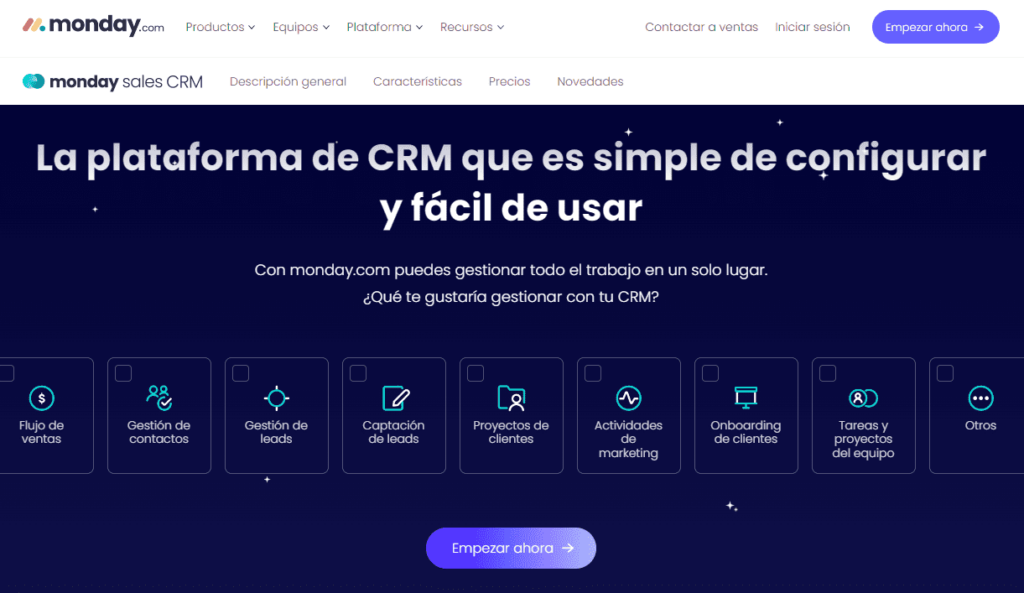
La plataforma Monday.com integra sus herramientas de automatización con su software de gestión de relaciones con clientes (CRM). Puede ser una de las mejores alternativas para organizaciones que pongan el foco en las herramientas colaborativas y de trabajo en equipo, más que en las funciones de marketing avanzadas.
Las automatizaciones están disponibles a partir del segundo nivel de sus planes de pago, donde se pueden automatizar 250 acciones al mes. Para esto, se utiliza un editor visual de arrastrar y soltar que simplifica el proceso.
Uno de los puntos fuertes de Monday.com es su plataforma de gestión de proyectos sofisticada, que facilita la automatización de los flujos de trabajo. En cambio, para quienes se centran principalmente en el marketing y la captación de leads, Monday.com podría quedarse corto.
Aunque Monday.com facilita la organización de pruebas A/B en equipo a través de plantillas, es necesario recurrir a herramientas externas para su implementación. El envío de emails masivos y las plantillas de correo electrónico solo están disponibles en los planes Pro y Enterprise, mientras que en otras herramientas se trata de funciones básicas incluidas por defecto en todos los planes.
Precios de Monday Sales CRM
- Ofrece un plan gratis con 3 tableros y 2 usuarios
- Todos los planes incluyen una base de contactos ilimitada, pero las funciones de marketing son reducidas
- Los planes se pagan por usuario, con un mínimo de tres. El más barato (Basic CRM), cuesta 15 € por usuario al mes (es decir, la tarifa inicial serían 45 €/mes)
Customer.io: procesamiento de datos avanzado
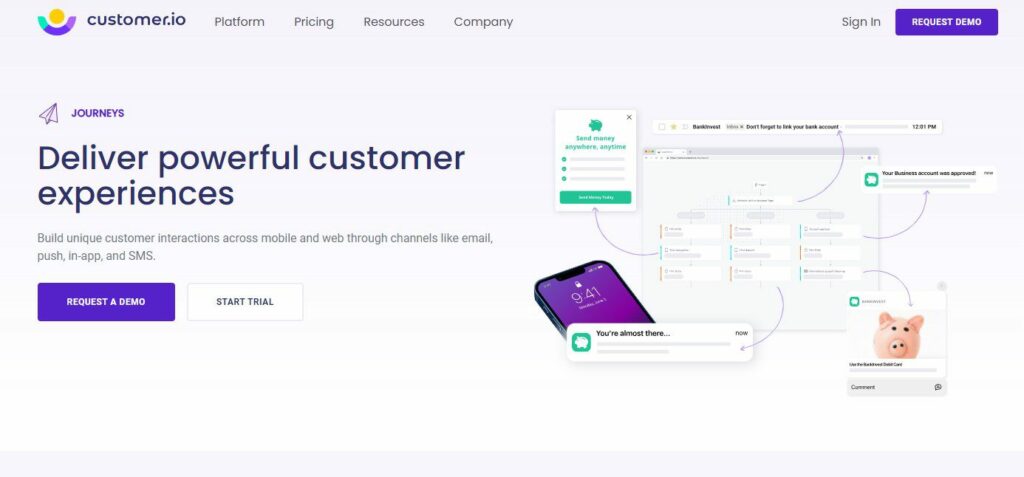
Customer.io es un software de automatización de marketing con una gran capacidad de procesamiento de datos en tiempo real, ideal para una segmentación y personalización avanzadas. Permite integrar recorridos de cliente con múltiples ramificaciones, así como un número ilimitado de segmentos y propiedades personalizadas, lo que brinda flexibilidad a las campañas de marketing.
Esta herramienta destaca sus capacidades multicanal. Además de email marketing, integra SMS y notificaciones push ilimitadas en todos sus planes. Esto se complementa con la creación de flujos de trabajo ilimitados y las pruebas A/B, también disponibles para todos los usuarios.
Al igual que HubSpot, Customer.io también presenta un salto de precios importante entre sus dos primeros planes de pago. Sin embargo, el plan inicial de Customer.io tiene menos restricciones que el plan Starter de HubSpot. Otra diferencia es que la cuota de incorporación es opcional en Customer.io.
Precios de Customer.io
- Ofrece prueba gratuita, pero no es permanente
- Los precios dependen del número de emails enviados
- Plan Essentials por 100 $/mes: incluye 1 millón de emails al mes, pruebas A/B, informes, segmentación, etc.
- Plan Premium por 1000 $/mes: límite de envíos personalizado, soporte por chat, servicio de incorporación, etc.
Omnisend: un único plan tarifario con todas las funciones
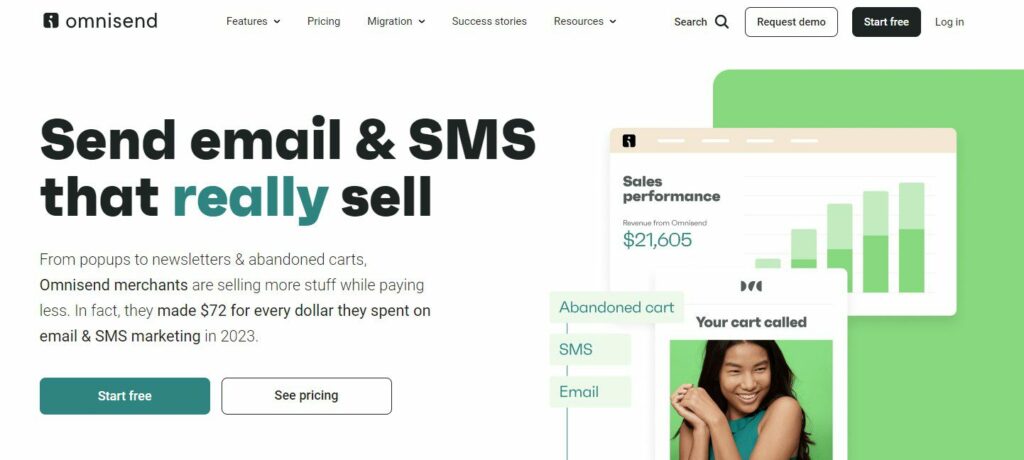
Omnisend es una de las alternativas de HubSpot más valoradas entre las pymes y startups de comercio electrónico, con más de 100 000 usuarios en todo el mundo. Es una plataforma adecuada cuando el envío de emails transaccionales tiene un peso importante en la estrategia de marketing.
Esta plataforma destaca por sus servicios multicanal, con automatización del marketing en correos electrónicos, páginas de destino, notificaciones push y mensajes SMS. Permite configurar audiencias personalizadas en Facebook e Instagram.
Omnisend ofrece una automatización del marketing completa, con herramientas como pruebas A/B, flujos de trabajo personalizables y recorridos de cliente a medida, aunque sus plantillas de correo electrónico e integraciones con herramientas externas son más limitadas. Además, no dispone de aplicación móvil.
Un punto fuerte de Omnisend es su estructura de precios sencilla, donde todas las funciones de marketing están disponibles independientemente del nivel de suscripción. Lo único que condiciona el precio es el tamaño de la base de datos de contactos y el volumen de emails enviados.
Precios de Omnisend
- Plan gratis con 250 contactos y 500 emails al mes
- Plan Standard con envíos limitados (aprox. contactos x 12): 20 $/mes para 1000 contactos, 81 $ para 5000 y 132 $ para 10 000
- Plan Pro con envíos ilimitados: 59 $/mes para 1000 contactos, 90 $ para 5000 y 150 $ para 10 000
Tu mejor alternativa a Hubspot para ahorrar tiempo y comunicar mejor
Esta guía presenta 10 alternativas al Marketing Hub de HubSpot. Excepto en el caso de Marketo Engage y Salesforce, se caracterizan por ser más accesibles económicamente y adaptarse a las necesidades de las pymes y startups, con estructuras de precios que aumentan de forma paulatina.
Cada una de las alternativas a HubSpot tiene sus puntos fuertes —gestión de proyectos, informes avanzados, comercio electrónico, etc.—, y por eso existen integraciones para conectarlas entre sí y usar varias al mismo tiempo. Por ejemplo, Brevo tiene plugins de integración con Zoho y Salesforce, y más de 6000 integraciones externas en la plataforma Zapier.
Para afinar tu decisión, puedes seleccionar las 2 o 3 herramientas de automatización que mejor se adapten a tus objetivos y usar su prueba gratuita. Después, ¡elige tu plataforma y lánzate a la acción con campañas que dejen huella!







